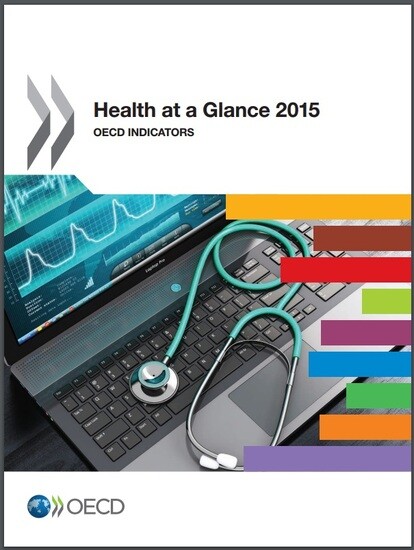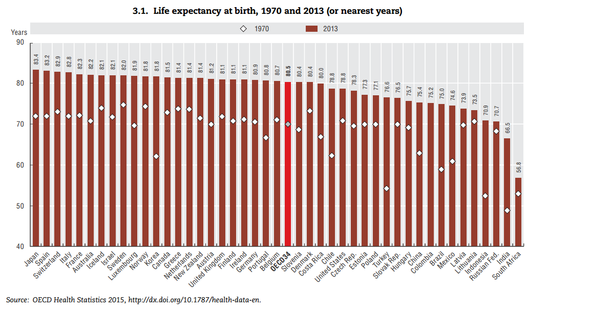hankyoreh
Links to other country sites 다른 나라 사이트 링크
Hypochondria nation? South Koreans vastly understate their health

South Koreans rank fairly high among members of the Organization for Economic Cooperation and Development (OECD) in terms of expected lifespan, the objective index of public health. But the percentage of South Koreans who describe themselves as healthy, which is the subjective health rate, was the lowest of all OECD members.
According to a report called “South Koreans’ Health and Their Use of Medical Institutions” released by the Korea Institute for Health and Social Affairs (KIHASA) on Jan. 22, South Korea’s expected lifespan (the number of years that a boy or girl born in that year is expected to live) was 81.8 years, or 1.3 years older than the average expected lifespan of 80.5 years in OECD countries. South Koreans’ healthy lifespan (which subtracts periods of disease and injury from the expected lifespan) was 73 years, which was also fairly high among OECD countries.
http://www.oecd.org/health/health-systems/health-at-a-glance-19991312.htm

But the subjective health rate, or the percentage of South Koreans 15 years or above who report that they are in good health, was 35.1%, the lowest of any OECD member. In New Zealand, the US, and Canada, this percentage was as high as 80 to 90%, while the OECD average was 69.2%. The only two countries in the OECD whose subjective health rate was below 40% were South Korea and Japan.
The report attributed this huge gap between objective health indicators and subjective health assessment to “socioeconomic factors.” In other words, the authors of the report believe that South Koreans are liable to hypochondria – believing their health to be much worse than it actually is.
An identical gap between objective indicators and subjective assessments also appeared in a survey of obesity and being overweight.
A study measuring South Koreans’ height and weight found that 31.5% of the population are overweight or obese. This was the second lowest in the OECD after Japan (24.1%) and considerably lower than the OECD average of 56.2%.
But the percentage of South Koreans who actually think they are overweight or obese was much lower than this, at only 24.4%. The authors of the report said this appeared to result from the lookism that is prevalent in South Korean culture, in which people often report their weight to be lower than it actually is.
By Lee Chang-gon, Director of the Hankyoreh Social Policy Institute
Please direct questions or comments to [english@hani.co.kr]

Editorial・opinion
![[Editorial] Does Yoon think the Korean public is wrong? [Editorial] Does Yoon think the Korean public is wrong?](https://flexible.img.hani.co.kr/flexible/normal/500/300/imgdb/original/2024/0417/8517133419684774.jpg) [Editorial] Does Yoon think the Korean public is wrong?
[Editorial] Does Yoon think the Korean public is wrong?![[Editorial] As it bolsters its alliance with US, Japan must be accountable for past [Editorial] As it bolsters its alliance with US, Japan must be accountable for past](https://flexible.img.hani.co.kr/flexible/normal/500/300/imgdb/original/2024/0417/6817133413968321.jpg) [Editorial] As it bolsters its alliance with US, Japan must be accountable for past
[Editorial] As it bolsters its alliance with US, Japan must be accountable for past- [Guest essay] Amending the Constitution is Yoon’s key to leaving office in public’s good graces
- [Editorial] 10 years on, lessons of Sewol tragedy must never be forgotten
- [Column] A death blow to Korea’s prosecutor politics
- [Correspondent’s column] The US and the end of Japanese pacifism
- [Guest essay] How Korea turned its trainee doctors into monsters
- [Guest essay] As someone who helped forge Seoul-Moscow ties, their status today troubles me
- [Editorial] Koreans sent a loud and clear message to Yoon
- [Column] In Korea’s midterm elections, it’s time for accountability
Most viewed articles
- 1[Column] The clock is ticking for Korea’s first lady
- 2Samsung barricades office as unionized workers strike for better conditions
- 3[Editorial] When the choice is kids or career, Korea will never overcome birth rate woes
- 4[Guest essay] How Korea turned its trainee doctors into monsters
- 5Why Israel isn’t hitting Iran with immediate retaliation
- 6S. Korea, Japan reaffirm commitment to strengthening trilateral ties with US
- 7Japan officially says compensation of Korean forced laborers isn’t its responsibility
- 8[Editorial] As it bolsters its alliance with US, Japan must be accountable for past
- 9Korea, Japan jointly vow response to FX volatility as currencies tumble
- 10‘Right direction’: After judgment day from voters, Yoon shrugs off calls for change